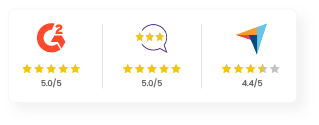The Impact of LXPs on Modern Workplace Learning

Employee L&D has come a long way from the days of the one-size-fits-all approach. As training requirements are evolving, L&D teams as well as learners have collectively felt the need for a more comprehensive and robust learning environment.
Enter Learning Experience Platforms or LXPs that essentially came into the picture to fulfil this very requirement.
An LXP is a tool designed to meet the increasing demand for more personalized learning experiences in modern workplaces. It is fast becoming the learning platform of choice where only a traditional LMS cannot suffice the ask for extremely tailored and customized employee learning experiences.
Also, at a time when 89% of business leaders agree that skilling is increasingly important for organizations, LXPs equipped with the power of artificial intelligence (AI) are proving to be the pathway for offering holistic and interactive learning experiences.
In this blog post, we will deep dive into the impact of AI-powered LXPs on modern workplace learning and how they are reshaping the way organizations are approaching employee learning and training.
The Evolution of Workplace Learning with LXPs
In the modern workplace, employees seek learning opportunities as an integral part of their job experience. They look for employers who provide a modern and progressive approach to learning. Research from LinkedIn Learning indicates that nearly 60% of individuals choose to join companies with the expectation of enhanced career paths or increased learning opportunities.
An LXP effectively helps organizations meet these employee expectations by facilitating personalized learning experiences. It plays a pivotal role in guiding employees toward self-improvement, increasing efficiency, teamwork and coordination. Industry analyst Josh Bersin rightly identifies the LXP as solutions that are at the forefront of corporate learning’s new era.
The Positive Impact of LXP on Modern Workplace Learning
As a dedicated learning platform, an LXP enables organizations to craft impactful learning experiences and enhance employee productivity. We will look at different areas in detail to understand an LXP’s overall impact on modern workplace learning.
Attracting and Retaining Top Talent
In the modern workplace, employees exhibit a strong desire for learning and career development. According to a LinkedIn report, 94% employees say they would stay at a company longer if it invested in their development. Organizations need to explore various avenues to offer employees easy learning opportunities for skill development.
However, traditional approaches to learning are often known to disrupt employees’ regular job responsibilities, resulting in decreased productivity and lost work hours. This is where platforms like LXPs help by enabling learning in the flow of work.
LXPs incorporate microlearning or bite-sized learning modules that employees can easily access in their free time during work hours. They can read blogs on topics they need help with, watch crisp tutorials, or even take interactive quizzes related to the skills required for their specific job role.
By integrating these learning opportunities into their workday, LXPs enable employees to transition effortlessly between training and their regular tasks.
Ensuring Capability Development
In an ever-evolving digital landscape, knowledge can become obsolete quickly. There’s a chance that employees’ unique strengths, skills, and expertise can lose relevance faster than in the past. To address this challenge, employees must consistently enhance their skills and stay updated with the latest trends.
LXPs help address this by offering easy upskilling opportunities with their user-friendly interface. Learners can effortlessly navigate an LXP searching for videos, blogs and various other learning content. An LXP also empowers employees to craft their own learning paths by incorporating internal and external content, thus tailoring the learning experience.
Designed for efficiency, LXPs also include features that can track employee progress, offering a clear overview of upcoming training, ongoing activities and curated top picks. Employees even get insights into their course completion status, total training hours and a comprehensive view of their learning journey.
Motivating and Engaging Employees
Employees who are motivated are known to perform better in their roles, and consequently, are more likely to stay longer with the company. But what drives this motivation? As per a Udemy Academy survey, 46% of those surveyed said learning paths personalized to their goals would help motivate them.
An LXP enables personalized learning experiences for each employee with AI and machine learning. Recommendations for learning resources are practical, based on factors such as individual employee profiles, interests, and historical training data. This eliminates the need for admins and L&D managers to manually suggest courses.
This also guarantees sustained employee engagement during training, as the platform consistently recommends personalized content and courses for each employee. Employees not only remain actively involved but are also able to refine their skills, ultimately contributing to their continued productivity at work.
Creating a Collaborative Learning Culture
According to Josh Bersin, learners retain only 5% of what they hear and 10% of what they read, but they remember more than 50% of what they learn through discussion and interaction. In general, collaborative learning is known to result in better knowledge retention compared to traditional top-down approaches.
An LXP, by its structure and interface, promotes collaborative learning and knowledge sharing among learners. The essence of an LXP revolves around the idea of social learning enabling employees to navigate courses, undertake exercises and view instruction videos on any device based on suggestion by their peers. From content sharing to receiving feedback and highlighting significant milestones within their network, employees can easily interact with their colleagues and peers.
Ensuring Continuous Learning
In order to remain competitive in the global market, organizations need to be innovative, adaptable, and in a constant state of evolution. This means they need to offer their employees continuous learning so that they can challenge themselves to obtain new skills and knowledge.
LXPs are excellent platforms when it comes to facilitating continuous learning. Given their responsive interface across varied devices and content, an LXP simplifies the learning process, enabling employees to access and consume content at their convenience, wherever they may be.
With features like mobile learning, an LXP leverages AI for super personalized content while catering to diverse training needs, covering formal training, informal learning, just-in-time learning, self-directed and self-paced learning.
Wrapping Up
LXPs are redefining modern workplace learning by offering tailored and accessible training experiences. A scalable solution, LXPs accommodate evolving learning needs without sacrificing performance, making them a valuable asset.
Investing in a robust AI-powered LXP is a necessity for organizations across industries given that these platforms enhance productivity and operational efficiency, empowering employees to steer their professional growth.
Simultaneously, they equip organizations to flourish amidst rapid change. Undoubtedly, the future of modern workplace learning is innately linked to the transformative capabilities of LXPs for creating a workforce that is not only skilled but also adaptable and future-ready.











